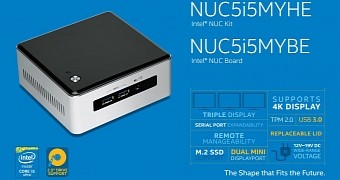Intel has made available a new BIOS package targeted at its NUC5i5MY Next Unit Computing (NUC), namely version 0028, compatible with the NUC5i5MYBE board and NUC5i5MYHE kit, which fixes issues with PXE security and secure boot, and more.
In addition to that, this release also resolves the problems encountered with Toshiba x2 NVME THNSNN256GSX7 SSD models that wouldn’t boot, as well as the issue where Single Max Turbo Rate option could be modified even though User Access is set to View Only.
When it comes to installation, first of all, bear in mind that an upgrade must be considered only when the newer version specifically solves an issue that has been bothering you until now or implements a feature that you can make use of.
If you want to apply version 0028, you should know that Intel has provided 4 downloadable files describing different installation methods so that you can have a choice.
To be clear, the Recovery BIOS Update (.BIO) file is to be used for upgrading via an F7 BIOS Update method. Moreover, this package can also recover the BIOS in the event where it has been left in an unusable state.
When it comes to the iflash BIOS Update archive, this file can apply version 0028 if it’s used from a USB or CD drive and only through a DOS command prompt.
As for the 2 Express BIOS Update executables, these packages must be run directly from a Windows 7, 8.1, or 10 platform, or from one of Microsoft’s Windows Server 2008 R2 or 2012 R2 OSes.
Therefore, download Intel NUC5i5MY NUC BIOS 0028, apply it, and make sure not to turn off/reboot the NUC to avoid any malfunctions. Also, don’t initiate this process on overclocked settings; prior to flashing, don’t forget to load BIOS default settings.

 14 DAY TRIAL //
14 DAY TRIAL //